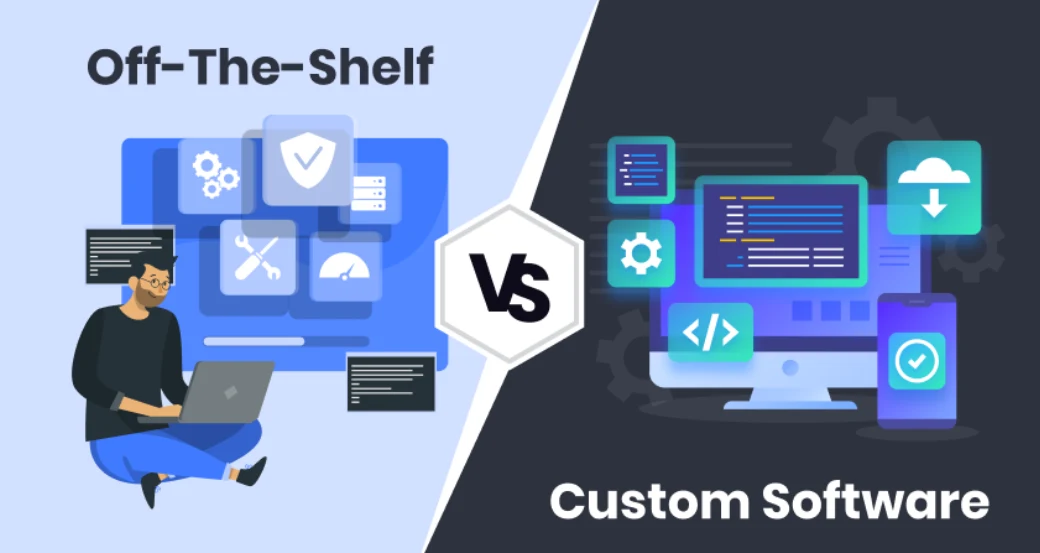1. What is Custom Enterprise Software Development?
In today’s fast-paced digital landscape, businesses need more than general software to stay competitive. Off-the-shelf results frequently fall short in meeting unique functional demands, leading to inefficiencies and missed opportunities. This is where custom enterprise software development comes into play— a tailored approach to developing software that aligns impeccably with a company’s workflows, security requirements, and long-term growth strategies.
According to recent market research, the global enterprise software market is projected to reach $295 billion in 2025, pressing the growing reliance on technical business results. Whether it’s automating workflows, integrating heritage systems, or enhancing data security, custom-built software offers unequaled advantages over pre-packaged alternatives.
In this comprehensive guide, we’ll explore:
● What custom enterprise software development entails
● Its key benefits over off-the-shelf solutions
● Best practices for successful implementation
● How to pick the best company to develop enterprise software for your organization
In this comprehensive guide, we’ll explore:
● What custom enterprise software development entails
● Its key benefits over off-the-shelf solutions
● Best practices for successful implementation
● How to pick the best company to develop enterprise software for your organization

2. Understanding Custom Enterprise Software Development
What Makes It Different?
Custom enterprise software development refers to the process of designing, building, and deploying software solutions specifically adapted to a business’s unique conditions. Unlike off-the-shelf products, which offer a one-size-fits-all approach, custom software is built from scratch to address precise challenges, whether it’s streamlining force chain operation, perfecting client relationship shadowing, or enhancing internal HR processes. For example, a custom software development company in India might develop an ERP system that integrates seamlessly with a manufacturer’s workforce tools, whereas a standard ERP may bear expensive variations. This position of personalization ensures advanced effectiveness, smoother relinquishment, and better ROI in the long run.
Industries That Benefit the most:
Nearly every sector use work custom enterprise software, but some of the biggest users include
● Healthcare: Patient management systems with HIPAA compliance
● Finance: Secure banking and fraud detection platforms
● Retail & E-commerce: AI-driven inventory and order management
● Manufacturing: IoT-enabled production monitoring
● Logistics: Real-time fleet and shipment tracking
A study by Gartner found that associations using custom-built results achieve 15x higher ROI compared to those relying on general software, proving that acclimatized systems drive measurable business growth.
3.Key Benefits of Custom Enterprise Software
1. Perfect Alignment with Business Needs
Commonly, off-the-shelf software lacks essential functions and has unwanted features. Custom results exclude this problem by focusing solely on what your business requires. For example, an enterprise mobile application development company can design an app simply for field service brigades, incorporating GPS shadowing, real-time reporting, and offline access — features infrequently set up in standard apps.
2. Enhanced Security & Compliance
Data breaches cost businesses an average of $4.45 million per incident (IBM, 2023). Custom software minimizes vulnerabilities by enforcing part-grounded access controls, end-to-end encryption, and compliance with assiduity regulations (GDPR, SOC 2, etc.).
3. Seamless Integration with Existing Systems
Modern SaaS platforms often have trouble communicating with legacy systems. Custom development ensures smooth integration, barring data silos and perfecting cross-departmental collaboration.
4. Scalability for Future Growth
Custom solutions are built with scalability at their core, making it easy to add new features or modules without disrupting existing operations.
5. Cost Efficiency in the Long Run
While the original investment is advanced, custom software eliminates recreating licensing rights and reduces reliance on multiple third-party tools, saving businesses up to 30% in functional costs over time.
4. Custom Enterprise Software vs. Off-the-Shelf Software: A Detailed Comparison
You may choose between a custom-built solution tailored to your unique requirements or an off-the-shelf (OTS) product that’s ready for immediate use. The table below offers a clear and easy-to-understand comparison of both options to guide your choice.
Go Custom If You…
✔ Need a perfect fit for complex workflows.
✔ Require high security & compliance (e.g., healthcare, finance).
✔ Plan to scale rapidly without software limitations.
✔ Want full ownership and no vendor lock-in.
Choose Off-the-Shelf If You…
✔ Need a quick, low-cost solution for common tasks.
✔ Don’t have unique requirements (e.g., basic accounting, email).
✔ Prefer minimal maintenance (though updates may still be disruptive).
| Factor | Custom Enterprise Software | Off-the-Shelf (OTS) Software |
|---|---|---|
| Customization | Fully tailored to your business processes, workflows, and branding. No unnecessary features—only what you need. | Limited flexibility. You get what the vendor offers, often with bloated features you’ll never use. |
| Cost | Higher initial investment, but long-term savings (no licensing fees, reduced inefficiencies). | Lower upfront cost, but hidden expenses (subscriptions, add-ons, forced upgrades). |
| Implementation Time | Longer development time (weeks to months) because it is a custom creation. | Ready to deploy in days or weeks (but may require training). |
| Scalability | Grows with your business. Easily add features, users, or integrations. | Limited by vendor updates. Scaling may require expensive migrations. |
| Integration | Seamless compatibility with your existing tools (ERP, CRM, legacy systems). | May struggle with integration, requiring costly workarounds. |
| Security | Built with your security needs in mind (custom encryption, access controls, compliance). | Generic security—hackers often target popular OTS software. |
| Support & Maintenance | Dedicated support from your development team. Quick bug fixes and updates. | Vendor-dependent support. Slow response times, especially for niche issues. |
| Ownership & Control | You own the code. Full control over updates, features, and data. | Licensed for use only. Vendor controls updates and may discontinue support. |
| User Experience (UX) | Designed for your team’s workflow, reducing training time and boosting productivity. | One-size-fits-all UI—employees may struggle with irrelevant features. |
| Competitive Advantage | Unique features that competitors don’t have, giving you a market edge. | Same as everyone else—no differentiation. |
| Best For | Businesses with unique processes, strict compliance needs, or long-term growth plans. | Startups or small businesses need quick, basic solutions. |
Which One Should You Choose?
Go Custom If You…
✔ Need a perfect fit for complex workflows.
✔ Require high security & compliance (e.g., healthcare, finance).
✔ Plan to scale rapidly without software limitations.
✔ Want full ownership and no vendor lock-in.
Choose Off-the-Shelf If You…
✔ Need a quick, low-cost solution for common tasks.
✔ Don’t have unique requirements (e.g., basic accounting, email).
✔ Prefer minimal maintenance (though updates may still be disruptive).

5.Best Practices for Successful Implementation
1. Define Clear Business Objectives
Before development begins, identify key pain points and desired outcomes. A well-documented strategy ensures the final product aligns with business goals.2. Choose the Right Development Partner
Selecting an experienced enterprise software development company is crucial. Look for:● Proven expertise in your industry
● Strong portfolio of past projects
● Agile development methodologies
● Post-launch support & maintenance
3. Prioritize User Experience (UX)
Employees and customers should find the software intuitive. To improve the UI, test usability early.4. Implement Robust Testing
Thorough QA checks—including performance, security, and compatibility testing—prevent costly post-launch fixes.5. Plan for Continuous Improvement
Software should evolve with business needs. Regular updates, feature enhancements, and user feedback loops keep the system relevant.6.Conclusion
Nowadays, creating custom enterprise software is crucial for businesses trying to increase scalability, security, and efficiency. By partnering with the right custom software development company in India or globally, associations can achieve results that drive invention, reduce costs, and outperform challengers.
Whether you need a business software development solution for finance, healthcare, or logistics, investing in custom-made software ensures long-term success in an increasingly digital world.
By recognizing the value of custom enterprise software development, businesses can make strategic decisions that enhance efficiency, foster innovation, and support long-term growth.
Ready to transform your operations? Collaborate with a trusted development team today!

The Author
Ramkumar Pichandi
Founder,Rytsense Technolgies
I’m a founder who builds for one reason → To solve real bottlenecks with real technology.
